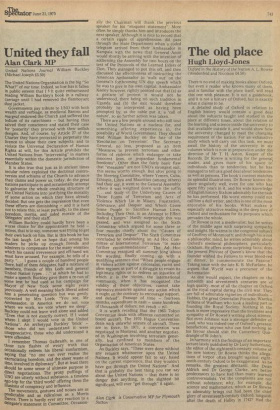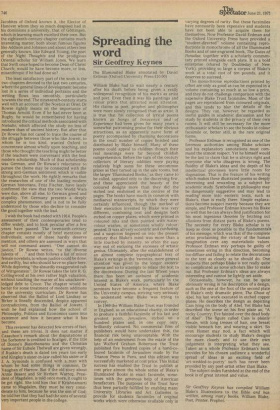The old place
Hugh Lloyd-Jones
Oxford in the History of the Nation A. L. Rowse (Weidenfeld and Nicolson £4.50) There is no end of making books about Oxford; but even a reader who knows many of them, and is familiar with the place itself, will read this one with pleasure. It is not a guidebook, and it is not a history of Oxford, but is exactly what it claims to be.
A detailed study of Oxford in relation to English history would contain a good deal about the subjects taught and studied in the place at different times, about the relation of the learning and science inside the university to that available outside it, and would show how the university changed to meet the changing requirement of the nation. For an exhaustive study which will carry out this task, we must await the history of the university in six volumes which is now in preparation under the direction of Mr T. H. Aston, Keeper of the Records. Dr Rowse is writing for the general, reader, and gives more of his space to individuals than to tendencies; but he has managed to tell us a good deal about tendencies as well as persons. The book's content matches its splendid illustrations. Dr Rowse knows the place singularly well, even for one who has spent fifty years in it; and his wide knowledge of English history fits him admirably for the task he has performed. His worst enemy could not call him a dull writer, and this is one of the most enjoyable of his books. What makes it especially attractive reading is the deep love of Oxford and enthusiasm for its purposes which pervades the whole.
Dr Rowse is not a medievalist, but he writes of the middle ages with surprising sympathy and insight. He warms to the congenial subject of Geoffrey of Monmouth; and though his is not a philosophic mind, he writes admirably about Oxford's medieval philosophers, particularly Ockham. He offers some surprising facts; does the present Provost of Queen's know that the founder wished the Fellows to wear blood-red at dinner, to commemorate the Passion? Taking issue with the late K. B. McFarlane, he argues that Wyclif was a precursor of the Reformation.
As one would expect, the chapters on the sixteenth and seventeenth centuries are of high quality, most of all the chapter on Oxford as the royal capital during the civil war. They are full of admirable vignettes of individuals — Hobbes, the great Orientalist Pococke, Warden Wilkins of Wadham who took a leading part in founding the Royal Society. Nothing in the book is more impressive than the liveliness and sympathy of Dr Rowse's writing about science. Not even Johnson was a stronger defender of Laud, who was indeed one of Oxford's greatest benefactors; anyone who can find nothing in his favour should visit the Canterbury Quadrangle or St John's.
In harmony with the findings of an important lecture lately published by Dr Lucy Sutherland, the editor of the eighteenth-century volume of the new history, Dr Rowse thinks the allegations of torpor often brought 'against eighteenth-century Oxford to be exaggerated. As he remarks, the greatest dilettanti, like Dean Aldrich and Dr George Clarke, are better predecessors to have had than many learned controversialists. Yet the complaints are not without substance; why, for example, did science and mathematics, which as Dr Rowse so admirably brings out had been the chief glory of seventeenth-century Oxford, languish after the death of Halley in 1742? Had the
Jacobites of Oxford known it, the Elector of Hanover whom they so much despised had in his dominions a university, that of Gottingen, which in learning much excelled their own. But the eighteenth-century chapter contains much interesting matter, both about famous figures like Addison and Johnson and about others less generally known, like Edward Young, the poet of the Night Thoughts and the prodigious Oriental scholar Sir William Jones. We learn that Swift once hoped to become Dean of Christ Church; would he have become more, or less, misanthropic if he had done so?
The least satisfactory part of the work is the two chapters devoted to the last two centuries, where the general lines of development become lost in a series of individual portraits and the writing flows less smoothly, particularly towards the end: The nineteenth--century starts well with an account of the Noetics at Oriel; Dr Rowse rightly insists on the importance of Thomas Arnold. Even if he had never been at Rugby, he would be remembered for having introduced the critical methods associated with Niebuhr, which affected the study no less of modern than of ancient history. But after that Dr Rowse has not cared to trace the course of the struggle between those who like Jowett, to whom he is too kind, wanted Oxford to concentrate almost wholly upon teaching, and those who thought the teaching might be better if the teachers were conversant with the best modern scholarship. Much of that scholarship was German, and Dr Rowse's reluctance to pursue the theme may be connected with the strong anti-German sentiment which is visible throughout the work. He rightly remarks that the researches of one of the leading modern German historians, Fritz Fischer, have lately ' confirmed the view that the two World Wars were due, above all else, to German greed and stupidity. Yet Germany presents a deeply complex phenomenon, and is not to be fully understood by those who decline to consider the good together with the bad.
I wish the book had ended with 1914. People's assessment of their contemporaries tend to differ widely, and to look peculiar after a few years have passed. The twentieth-cehtury chapter consists mostly of brief mentions of individuals; some of these hardly deserve mention, and others are assessed in ways that will not command assent. "One cannot do justice," Dr Rowse writes, "to the diverse talents of . . ." and then follows a list of minor female novelists, to whom justice could be done, and swiftly, but who should have no place here. While deploring "the absurdly exaggerated cult of Wittgenstein", Dr Rowse takes the late R. G. Collingwood at his own rather high valuation, without touching the matter of his unacknowledged debt to Croce. The chapter would be better for some treatment of modern additions to the university curriculum. Dr Rowse has observed that the Balliol of Lord Lindsay or .13irker is lineally descended, despite apparent contradictions, from the Balliol of Jowett. I wish he had explained how the school of Philosophy, Politics and Economics came into existence and how it became • what it has become.
This reviewer has detected few errors of fact, and these are trivial. It does not matter if Casaubon's remark about the disputations at the Sorbonne is credited to Scaliger, if the title of Donne's Biaiothanatos and the Christian name of Sir Eubule Thelwall are given wrongly, if Ruskin's death is dated ten years too early and Kingley's sister-in-law called his sister or if J. A. Symonds is confused with a ,man with whom he had some things in common, Dr Vaughan of Harrow. But if the old story about Annie Besant and Sir Herbert Warren, President of Magdalen, is told once more, it ought to be got right. She told him that if Krishnamurti came to Magdalen, they must be very considerate to him, because he was the son of God; he told her that they had had the sons of several very important people in the college.



































 Previous page
Previous page